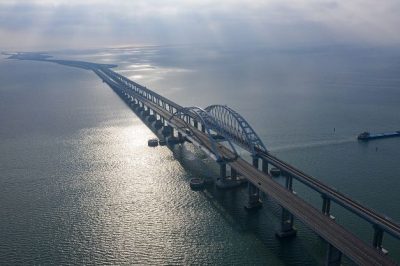Kiev Says Ready to Attack Crimean Bridge at First Opportunity

All Global Research articles can be read in 51 languages by activating the “Translate Website” drop down menu on the top banner of our home page (Desktop version).
To receive Global Research’s Daily Newsletter (selected articles), click here.
Visit and follow us on Instagram, Twitter and Facebook. Feel free to repost and share widely Global Research articles.
***
The Ukrainian government seems to be willing to further increase its military actions just to continue a conflict in which it has no chance of winning. On April 21, a Kiev official announced that they are about to bomb and destroy the Crimean Bridge.
In a recent speech, Secretary of the National Security and Defense Council, Oleksiy Danilov, revealed that Kiev’s armed forces are ready to attack the bridge at any time, having plans to act at the first possible opportunity. His words during an interview with Radio NV leave no doubt about the Ukrainian intentions: “If we had the ability to do it, we would have already done it. If there is an opportunity to do it, we will definitely do it”. Danilov also commented on the reasons behind the plan, mentioning the strategic value of the bridge, which destruction would largely obstruct the movement of Russian troops.
There are many problems with Danilov’s statement. In fact, it is possible to speak of a “strategic value” in its destruction of the Crimean Bridge, but this is far from implying any justification. Many anti-humanitarian measures have “strategic value” but should be avoided simply because they are legally and ethically wrong procedures. For example, it is precisely to avoid unreasonable civilian casualties and damage to historical heritage that Moscow refrains from excessive using of air force during the special military operation in Ukraine. No doubt there would also be strategic value in escalating the use of air force.
Carefully measuring one’s own acts to avoid mass victims should be the attitude of any side during a conflict. And this is what should be expected of Kiev, considering that the destruction of the bridge would cause civilian casualties, since non-military people still circulate in the region and would completely obstruct the flow of goods between Crimea and the rest of the Russian territory, which could lead to large supply deficits and social crises.
But, apart from the humanitarian and ethical argument, the main factor is another: Kiev is announcing military attacks on the sovereign territory of the Russian Federation. Both Kerch and Taman, cities connected by the bridge, are part of Russia, so the attack would hit a non-border Russian zone and its respective marine territory, generating a serious provocation. The risk of escalating the conflict into Russia’s sovereign territory may be too high for the Ukrainian side.
The words of Dmitry Medvedev, deputy chairman of the Russian Security Council, confirm this prediction of reaction in the event of an attack: “I hope he [Oleksiy Danilov] understands what Russia would target in retaliation”. Earlier, Kremlin spokesman Dmitry Peskov had already announced that Moscow would interpret a bombing of the bridge as a terrorist attack and announced that Moscow is already acting to prevent any Ukrainian action in this regard:
“Such a statement [about the potential bombing of the Crimean Bridge] is nothing but an announcement of a possible terrorist act; this is unacceptable (…) All the necessary security measures and precautions by the relevant service are being taken around the bridge and all strategic facilities”.
Still, it is necessary to emphasize the omission of Western countries and international organizations in this case. Kiev announces that it is organizing terrorist-like attitudes and Moscow condemns it, but with no statement of the rest of international society. Ignoring Kiev’s threats seems to have become standard, commonplace action in recent years while, on the other hand, actions of the Russian army are automatically condemned.
Finally, Kiev is on the verge of an escalation of the conflict in which it will not be able to deal with the consequences. If there’s really a plan going on to destroy the bridge, the best thing to do is to abort it.
*
Note to readers: Please click the share buttons above or below. Follow us on Instagram, Twitter and Facebook. Feel free to repost and share widely Global Research articles.
Lucas Leiroz is a researcher in Social Sciences at the Rural Federal University of Rio de Janeiro; geopolitical consultant.
Featured image is from InfoBrics

